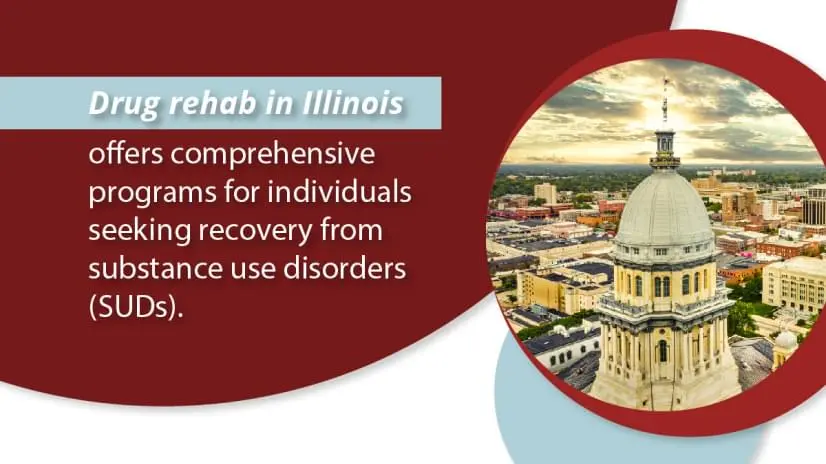
Harnessing the Power of Nature for Mental Health
Learn about the link between nature and mental health. Improve your mental health with Indiana Center for Recovery.

If you or a loved one are struggling with addiction in Rockford, Illinois, you are not alone. Find treatment just across the state line at Indiana Center for Recovery.

Drug rehab in Illinois offers vital support for overcoming addiction with diverse programs. Here is what you need to know:
Experience a safe and successful addiction recovery with Indiana Center for Recovery. Call us at (844) 650-0064 to reserve your treatment.
Drug rehabilitation, commonly known as drug rehab, plays a vital role in addressing the growing issue of substance abuse in Rockford, Illinois. The state of Illinois, like many others in the US, has witnessed a rise in drug-related problems, impacting individuals, families, and communities.
Drug rehab programs in Rockford, Illinois, aim to provide a structured and supportive environment for individuals struggling with substance use disorders (SUDs) to overcome their dependence on substances and achieve lasting recovery.
Factors contributing to the growing need for drug rehab in Rockford, Illinois, include:
Opioid Crisis: Rockford, like many other cities in Illinois, has been grappling with the opioid epidemic. The misuse of prescription pain-relieving drugs and the rise of illicit opioids have contributed to a surge in addiction cases and overdose deaths.
Alcohol Abuse: Excessive alcohol use is a pervasive issue, leading to physical and mental health issues. Rehab programs address not only illicit drug use but also alcohol addiction.
Stimulant Abuse: The misuse of stimulants like methamphetamine has become a prevalent issue in some regions of the state, including Rockford, necessitating specialized treatment approaches.
Mental Health and Dual Diagnosis: Substance abuse often coexists with mental illnesses. The need for integrated treatment for co-occurring conditions is crucial for successful rehabilitation.
The primary purpose of drug rehab is to help individuals overcome substance dependence and achieve sustained recovery. Rehab programs in Rockford, Illinois, are designed to address the physical, psychological, and social aspects of drug addiction.
In the journey towards recovery from substance abuse, individuals have access to a diverse range of drug rehab programs designed to address specific needs and stages of the recovery process. Here’s an overview of the different types of programs:
Medical detox programs serve as the crucial initial step in the recovery process. These programs provide a supervised environment where individuals can safely withdraw from substances under the care of medical professionals. The focus is on managing withdrawal symptoms and ensuring a secure transition to the next phase of rehabilitation.
Inpatient rehab programs, also called residential programs, offer immersive and structured environments for individuals seeking intensive support. Participants reside at the facility throughout treatment, benefiting from 24/7 care, therapy sessions, and a supportive community. By residing at the treatment facility, patients are lifted out of their routine so they can heal and build a more sustainable, drug-free routine.
Our residential treatment in Bloomington, Indiana, is close enough for visitations but far enough to encourage immersion in treatment. Inpatient programs are particularly effective for those requiring a focused and controlled setting to address their drug use.
For individuals seeking flexibility in their recovery journey, outpatient drug rehab programs near Rockford provide a balanced approach. Participants attend therapy sessions and receive support while maintaining their daily routines and responsibilities.
Outpatient programs, including a partial hospitalization program (PHP) and intensive outpatient program (IOP), suit those with a robust support system at home and the ability to manage their recovery outside a residential treatment facility.
Behavioral therapies form a crucial component of drug rehab, focusing on modifying harmful behaviors and thought patterns. These therapies, such as cognitive behavioral therapy (CBT) and dialectical behavior therapy (DBT), aim to equip individuals with coping mechanisms, resilience, and skills essential for long-term recovery. These therapies are provided in both individual and group therapy sessions.
Medication-assisted treatment programs integrate FDA-approved medications with counseling and behavioral therapies to enhance the effectiveness of addiction treatment programs. This approach is often employed for individuals recovering from opioid or alcohol dependence, providing a comprehensive strategy for long-term recovery.
Dual diagnosis programs cater to individuals facing both substance abuse and co-occurring mental health disorders. These integrated programs provide specialized care to address the complex mix between addiction and mental health, ensuring a comprehensive approach to healing.
Remember, the effectiveness of these drug and alcohol rehab programs depends on factors like individual needs, the severity of addiction, and personal commitment to recovery.
Choosing the right drug and alcohol rehab center is a crucial decision that requires careful consideration. Here are some key steps to help you make an informed choice:
Start by assessing personal needs and goals. Consider the severity of addiction, any co-occurring conditions, and preferences for specific treatment approaches.
Verify the accreditation and licensing of the rehab center. Ensuring the treatment facility meets industry standards guarantees the delivery of quality care.
Explore the range of treatment approaches offered. A comprehensive approach addressing physical, emotional, and psychological aspects enhances the chances of successful recovery.
Review the qualifications and credentials of the medical staff. Experienced and licensed professionals contribute to a safe and supportive environment.
Consider the facility’s amenities and overall environment. A comfortable and conducive setting can positively impact the recovery experience.
Understand the cost of treatment and check if insurance coverage is accepted. Clarify any potential additional expenses to avoid surprises.
Evaluate the location of the rehab center. Proximity to home or a change of scenery may influence the decision.
Review the duration of the treatment programs offered. Matching the program length with individual needs enhances the likelihood of successful outcomes.
Inquire about aftercare programs and ongoing support. A solid aftercare plan is essential for maintaining sobriety post-treatment.
Explore reviews and testimonials from former patients. Real-life experiences provide valuable insights into the efficacy of the recovery center.
By carefully considering these factors, you can make an informed decision and choose a rehab center that best suits your needs and sets the stage for a successful recovery.
Indiana Center for Recovery offers outpatient treatment in Merrillville, Indiana, just across the Illinois-Indiana border. Our residential treatment in Bloomington, Indiana, is close enough for family visits but far enough to encourage a commitment to treatment.
The drug and alcohol rehab process typically involves assessment, detoxification if needed, therapeutic interventions like counseling and behavioral therapies, and aftercare planning. The goal is to address physical and psychological aspects, fostering lasting recovery from drug abuse.
Indiana Center for Recovery welcomes patients who live in and near Rockford, Illinois, who want to experience a safe and successful recovery from substance use disorders (SUDs).
Our comprehensive addiction treatment encompasses proven methods like medical detoxification, evidence-based therapies, expert medication management, and holistic approaches. Experience compassionate care that addresses both the physical and emotional aspects of your recovery.
Take the first step towards a brighter future by contacting us at (844) 650-0064.